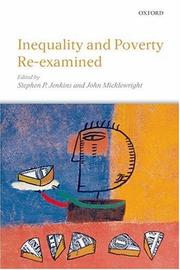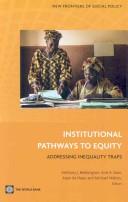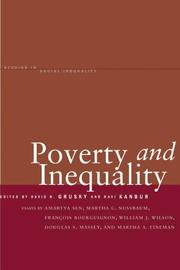| Listing 1 - 10 of 24 | << page >> |
Sort by
|

ISBN: 9780199218110 9780199218127 0199218129 0199218110 9786611149673 0191527289 1281149675 1435606965 6611149678 9780191527289 138303575X Year: 2007 Publisher: Oxford Oxford University Press
Abstract | Keywords | Export | Availability | Bookmark
 Loading...
Loading...Choose an application
- Reference Manager
- EndNote
- RefWorks (Direct export to RefWorks)
The issues surrounding poverty and inequality continue to be of central concern to academics, politicians and policymakers but the way in which we seek to analyse them continues to change. This is a guide to some of the new approaches that have been developed, while also making a contribution to the ongoing public debate.
Social stratification --- Social policy --- Social problems --- Poverty. --- Equality. --- Pauvreté --- Egalité (Sociologie) --- Equality --- Poverty --- #SBIB:316.8H15 --- #SBIB:316.8H40 --- Welzijns- en sociale problemen: sociale ongelijkheid en armoede --- Sociaal beleid: social policy, sociale zekerheid, verzorgingsstaat --- Pauvreté --- Egalité (Sociologie) --- E-books --- Destitution --- Wealth --- Basic needs --- Begging --- Poor --- Subsistence economy --- Egalitarianism --- Inequality --- Social equality --- Social inequality --- Political science --- Sociology --- Democracy --- Liberty

ISBN: 0821370138 0821370146 9780821370131 9780821370148 Year: 2008 Publisher: Washington, DC : World Bank,
Abstract | Keywords | Export | Availability | Bookmark
 Loading...
Loading...Choose an application
- Reference Manager
- EndNote
- RefWorks (Direct export to RefWorks)
Questions of equity and inequality have moved to the center of debates on development and poverty reduction. This reflects growing awareness that even countries with high rates of growth can experience stagnating or increasing inequality, and that inequality can itself limit the poverty reducing effects of growth. Indeed, recent work indicates that, in addition to its intrinsic value, equity should be valued for its positive impacts on growth and the poverty-reducing effects of such growth. These concerns are coupled with questions of governance. This is because institutional arrangements affe
Public expenditure --- Social stratification --- Social policy --- Social problems --- Income distribution. --- Institutional economics. --- Income distribution --- Equality. --- Poverty. --- Revenu --- Institutionnalisme --- Egalité (Sociologie) --- Pauvreté --- Cross-cultural studies. --- Répartition --- Etudes transculturelles --- Income distribution -- Cross-cultural studies. --- Institutional economics --- Equality --- Poverty --- Business & Economics --- Economic History --- Egalité (Sociologie) --- Pauvreté --- Répartition --- Destitution --- Egalitarianism --- Inequality --- Social equality --- Social inequality --- Distribution of income --- Income inequality --- Inequality of income --- Wealth --- Basic needs --- Begging --- Poor --- Subsistence economy --- Political science --- Sociology --- Democracy --- Liberty --- Distribution (Economic theory) --- Disposable income --- Economics
Book
ISBN: 9782600011648 2600011641 Year: 2007 Volume: 211 Publisher: Genève Droz
Abstract | Keywords | Export | Availability | Bookmark
 Loading...
Loading...Choose an application
- Reference Manager
- EndNote
- RefWorks (Direct export to RefWorks)
« Les inégalités se creusent… ». « Il faut réduire les inégalités ! ». Quiconque peut lire ou entendre quotidiennement ces lieux communs en forme de slogan. Or, ils ne seraient fondés qu'à la condition de pouvoir comparer, dans un domaine spécifique (celui des revenus, celui de la santé, etc.), des situations distinctes et, à partir de ces dernières, déduire une plus ou moins grande inégalité. Malheureusement, une analyse approfondie et sans a priori idéologique de la notion même d'inégalité et de la logique de la comparaison montre qu'en l'espèce on se heurte souvent à une impossibilité : les inégalités ne sont pas toujours comparables, toute « mesure » de celles-ci s'exposant à l'incohérence et risquant d'aboutir à une impasse méthodologique. Marc Barbut relève l'ambiguïté de ces questions et examine les principales théories de l'inégalité, ainsi que leur histoire depuis Vilfredo Pareto.
Equality --- Social sciences --- Egalité (Sociologie) --- Sciences sociales --- Comparative method --- Méthode comparative --- AA / International- internationaal --- 311.98 --- 313 --- 339.21 --- Bevolking naar de maatschappelijke klasse en stand. Wet van Pareto. --- Levenswijze en levensstandaard. Levensminimum. sociale indicatoren (Studiën). --- Ongelijkheid en herverdeling van vermogens en inkomens. Inkomensbeleid. --- Egalité (Sociologie) --- Méthode comparative --- Bevolking naar de maatschappelijke klasse en stand. Wet van Pareto --- Levenswijze en levensstandaard. Levensminimum. sociale indicatoren (Studiën) --- Ongelijkheid en herverdeling van vermogens en inkomens. Inkomensbeleid --- Income distribution --- Social stratification --- Mathematical models.

ISBN: 080474842X 0804748438 0804767599 1429415932 9781429415934 Year: 2006 Publisher: Stanford, Calif. Stanford University Press
Abstract | Keywords | Export | Availability | Bookmark
 Loading...
Loading...Choose an application
- Reference Manager
- EndNote
- RefWorks (Direct export to RefWorks)
This volume brings together leading public intellectuals—Amartya Sen, Martha C. Nussbaum, François Bourguignon, William J. Wilson, Douglas S. Massey, and Martha A. Fineman—to take stock of current analytic understandings of poverty and inequality. Contemporary research on inequality has largely relied on conceptual advances several decades old, even though the basic structure of global inequality is changing in fundamental ways. The reliance on conventional poverty indices, rights-based approaches to poverty reduction, and traditional modeling of social mobility has left scholars and policymakers poorly equipped to address modern challenges. The contributors show how contemporary poverty is forged in neighborhoods, argue that discrimination in housing markets is a profound source of poverty, suggest that gender inequalities in the family and in the social evaluation of the caretaking role remain a hidden dimension of inequality, and develop the argument that contemporary inequality is best understood as an inequality in fundamental human capabilities. This book demonstrates in manifold ways how contemporary scholarship and policy must be recast to make sense of new and emerging forms of poverty and social exclusion.
Social stratification --- Social problems --- Poverty. --- Equality. --- Marginality, Social. --- Social classes. --- Social policy. --- Pauvreté --- Egalité (Sociologie) --- Marginalité --- Classes sociales --- Politique sociale --- #SBIB:316.8H15 --- Welzijns- en sociale problemen: sociale ongelijkheid en armoede --- Pauvreté --- Egalité (Sociologie) --- Marginalité --- Equality --- Marginality, Social --- Poverty --- Social classes --- Social policy --- Egalitarianism --- Inequality --- Social equality --- Social inequality --- Political science --- Sociology --- Democracy --- Liberty --- National planning --- State planning --- Economic policy --- Family policy --- Social history --- Class distinction --- Classes, Social --- Rank --- Caste --- Estates (Social orders) --- Social status --- Class consciousness --- Classism --- Destitution --- Wealth --- Basic needs --- Begging --- Poor --- Subsistence economy --- Exclusion, Social --- Marginal peoples --- Social exclusion --- Social marginality --- Assimilation (Sociology) --- Culture conflict --- Social isolation --- People with social disabilities --- E-books
Book
ISBN: 9782875740786 Year: 2014 Publisher: Bruxelles [etc.] PIE-Peter Lang
Abstract | Keywords | Export | Availability | Bookmark
 Loading...
Loading...Choose an application
- Reference Manager
- EndNote
- RefWorks (Direct export to RefWorks)
L'approche suivie ici est multidimensionnelle et passe en revue de nombreuses questions : pauvreté et exclusion sociale, logement, investissement dans l'éducation, emploi, inégalités de salaire, dialogue social, intégration des immigrants et des travailleurs frontaliers, égalité des chances.
Equality --- Social integration --- Labor supply --- Egalité (Sociologie) --- Intégration sociale --- Marché du travail --- LU / Luxembourg - Luxemburg --- 203 --- 311.90 --- 321.90 --- 313 --- #SBIB:316.8H40 --- #SBIB:35H437 --- #SBIB:35H6090 --- Sociografie. Algemene beschrijving van de gemeenschappen (Sociologie). --- Spreiding en samenstelling van de bevolking: algemeenheden. --- Maatschappelijke klassen: algemeenheden. --- Levenswijze en levensstandaard. Levensminimum. sociale indicatoren (Studiën). --- Sociaal beleid: social policy, sociale zekerheid, verzorgingsstaat --- Beleidssectoren: sociale zekerheid --- Bestuur en beleid: nationale en regionale studies: Luxemburg --- Egalité (Sociologie) --- Intégration sociale --- Marché du travail --- Luxembourg (Grand Duchy) --- Economic conditions --- 21st century --- 20th century --- Sociografie. Algemene beschrijving van de gemeenschappen (Sociologie) --- Spreiding en samenstelling van de bevolking: algemeenheden --- Maatschappelijke klassen: algemeenheden --- Levenswijze en levensstandaard. Levensminimum. sociale indicatoren (Studiën)
Book
ISBN: 9780821377451 0821377450 0821377477 9786611959746 128195974X 0821377469 Year: 2009 Publisher: Washington DC : Houndmills, Basingstoke, Hampshire ; New York : World Bank ; Palgrave Macmillan,
Abstract | Keywords | Export | Availability | Bookmark
 Loading...
Loading...Choose an application
- Reference Manager
- EndNote
- RefWorks (Direct export to RefWorks)
Equality of opportunity is about leveling the playing field so that circumstances such as gender, ethnicity, place of birth, or family background do not influence a person's life chances. Success in life should depend on people's choices, effort and talents, not to their circumstances at birth. Measuring Inequality of Opportunities in Latin America and the Caribbean introduces new methods for measuring inequality of opportunities and makes an assessment of its evolution in Latin America over a decade. An innovative Human Opportunity Index and other parametric and non-parametric techniques are p
Equality --- Children --- Egalité (Sociologie) --- Enfants --- Government policy --- Politique gouvernementale --- Latin America --- Caribbean Area --- Amérique latine --- Caraïbes (Région) --- Region Caraibe --- Economic conditions --- Social conditions --- Conditions économiques --- Conditions sociales --- Childhood --- Kids (Children) --- Pedology (Child study) --- Youngsters --- Age groups --- Families --- Life cycle, Human --- Egalitarianism --- Inequality --- Social equality --- Social inequality --- Political science --- Sociology --- Democracy --- Liberty
Book
ISBN: 0821356658 9786610085200 1280085207 1417523514 Year: 2004 Publisher: Washington, DC : The World Bank,
Abstract | Keywords | Export | Availability | Bookmark
 Loading...
Loading...Choose an application
- Reference Manager
- EndNote
- RefWorks (Direct export to RefWorks)
Social stratification --- Social policy --- Income --- Economic conditions. Economic development --- Third World: economic development problems --- Latin America --- Equality --- Egalité (Sociologie) --- Caribbean Area --- Amérique latine --- Region Caraibe --- Caraïbes (Région) --- Social conditions --- Economic conditions --- Conditions sociales --- Conditions économiques --- #SBIB:39A74 --- Egalitarianism --- Inequality --- Social equality --- Social inequality --- Political science --- Sociology --- Democracy --- Liberty --- Etnografie: Amerika
Book
ISBN: 9782916097404 Year: 2012 Publisher: Montreuil Omniscience
Abstract | Keywords | Export | Availability | Bookmark
 Loading...
Loading...Choose an application
- Reference Manager
- EndNote
- RefWorks (Direct export to RefWorks)
La crise actuelle a mis un terme au mythique égalitarisme américain et la société a pris conscience des différences existant entre les castes privilégiées et ceux qui survivent avec des emplois précaires. Des intellectuels français et américains débattent de ce sujet et montrent comment cette ligne de faille s'est creusée dans la société.
Social conflict --- Equality --- Conflits sociaux --- Egalité (Sociologie) --- United States --- Etats-Unis --- Social conditions --- Conditions sociales --- Income distribution --- Social classes --- 313 --- 321.96 --- 339.21 --- US / United States of America - USA - Verenigde Staten - Etats Unis --- Levenswijze en levensstandaard. Levensminimum. sociale indicatoren (Studiën) --- Onderlinge relaties tussen klassen. Klassenstrijd --- Ongelijkheid en herverdeling van vermogens en inkomens. Inkomensbeleid --- Social conditions.
Book
ISBN: 2800413964 9782800413969 Year: 1989 Volume: [6] Publisher: Bruxelles Ed. l'Université de Bruxelles
Abstract | Keywords | Export | Availability | Bookmark
 Loading...
Loading...Choose an application
- Reference Manager
- EndNote
- RefWorks (Direct export to RefWorks)
La protection de l'environnement s'est, dès ses origines, fondée sur les sciences naturelles et les techniques et, depuis plus récemment, elle interagit avec l'économie, mais ses relations avec des aspects sociaux ont été l'objet de moins d'attention. L'environnement appelle pourtant la préservation de la (qualité de la) vie, et l'homme est bien un animal social. Or, si l'objectif de protection de l'environnement est généralement formulé de façon consensuelle, il va évidemment se trouver décliné de façons différentes selon des différenciations sociales. La pleine prise en compte de ces interactions conduit à formuler une série de questions. Comment se répartissent les impacts environnementaux dans une société ? Comment les objectifs et les actions orientés vers la protection de l'environnement peuvent-ils être lus dans le prisme des catégories sociales ? Quels en sont plus particulièrement les bénéficiaires et les perdants ? Quels sont ceux qui peuvent faire entendre leur voix, et influencent les critères ? Quelles pistes envisager pour une limitation des impacts négatifs de la croissance économique dans un double objectif d'équité sociale et de réduction des nuisances environnementales ?. Ces réflexions interrogent des aspects fondamentaux du développement durable et de l'écologie politique. Elles sont étudiées dans ce livre, en théorie et sur de nombreux cas pratiques au plan local et national, mais aussi plus largement dans le monde.
Environmental protection --- Equality --- Environmental policy --- Environnement --- Egalité (Sociologie) --- Social aspects --- Protection --- Aspect social --- Politique gouvernementale --- DNECOLO DNPOLIT DNSOCIA DNU-EUB EPUB-ALPHA-E EPUB-DNU-FT EPUB-LIV-FT LIVECOLO LIVPOLIT LIVSOCIA EDITIONSULB-B --- Maladies de l'environnement --- Inégalité sociale --- Aspect de l'environnement --- Politique de l'environnement --- Disparités régionales --- Écologisme
Book
ISBN: 9781107041745 1107041740 9781107300736 9781107614536 1107614538 1139893408 1107502853 1107501245 1107503930 1107497280 1107300738 1107506638 1107517001 Year: 2013 Publisher: Cambridge Cambridge university press.
Abstract | Keywords | Export | Availability | Bookmark
 Loading...
Loading...Choose an application
- Reference Manager
- EndNote
- RefWorks (Direct export to RefWorks)
Terms such as 'Social Europe' and 'European Social Model' have long resided in the political and regulatory lexicon of European integration. But in recent years, and in spite of the adoption of the Charter of Fundamental Rights, the EU social profile has entered a profound period of crisis. The ECJ judgments of Viking and Laval exemplify the unresolved tension between the EU's strong market imperatives and its fragile social aspirations while the ongoing economic crisis, while the various 'bail out' packages are producing a constant retrenchment of social rights. The status quo is one in which workers appear to shoulder most of the risks attendant on making and executing arrangements for the doing of work. Chapters in this book advocate a reversal of this trend in favour of fair mutualization, so as to disperse these risks and share them more equitably between employers, the state, and society at large.
Political philosophy. Social philosophy --- Sociology of work --- Political sociology --- Social law. Labour law --- European Union --- Europe --- Labor policy --- Labor --- Labor laws and legislation --- Equality --- Travail --- Egalité (Sociologie) --- Politique gouvernementale --- Droit --- Social conditions --- Economic conditions --- Conditions sociales --- Conditions économiques --- 334.151.50 --- EEC / European Union - EU -Europese Unie - Union Européenne - UE --- Sociaal beleid : algemeenheden. --- Egalité (Sociologie) --- Conditions économiques --- Labor and laboring classes --- Manpower --- Work --- Working class --- State and labor --- Economic policy --- Egalitarianism --- Inequality --- Social equality --- Social inequality --- Political science --- Sociology --- Democracy --- Liberty --- Sociaal beleid : algemeenheden --- Government policy --- Council of Europe countries --- Eastern Hemisphere --- Eurasia --- Law --- General and Others --- Labor policy - Europe --- Labor - Europe --- Labor laws and legislation - Europe --- Equality - Europe --- Europe - Social conditions - 21st century --- Europe - Economic conditions - 21st century
| Listing 1 - 10 of 24 | << page >> |
Sort by
|

 Search
Search Feedback
Feedback About UniCat
About UniCat  Help
Help News
News